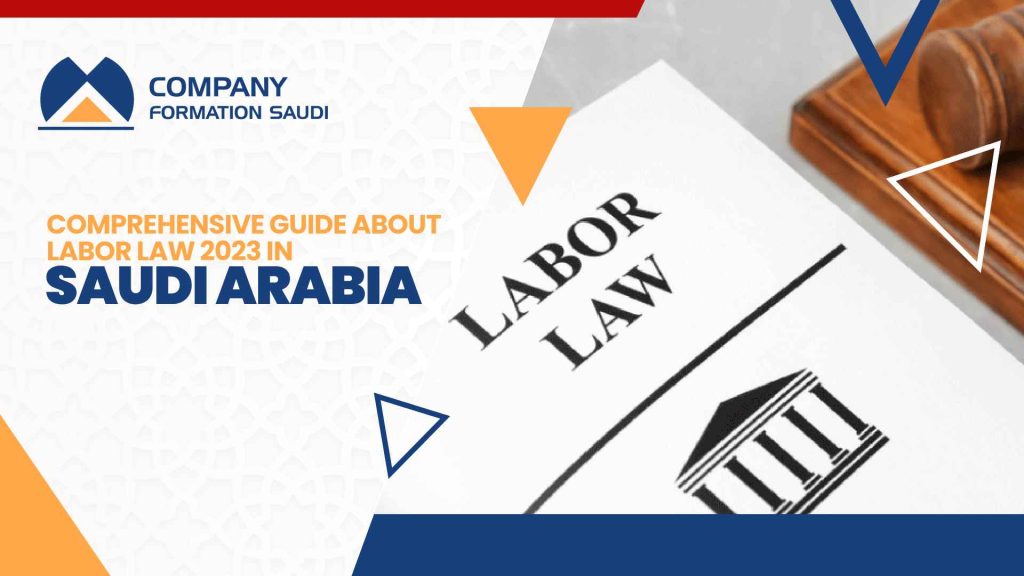Comprehensive Guide about Saudi Arabia Labor Law 2023
Knowing Saudi labor law is an important foundation if you want to get employed or start a business in Saudi Arabia. Likewise, knowledge of them can avoid legal labor problems in the country when hiring employees. It is also useful to know your employment rights in case you find a sponsor to work in the country.
In this article, you will learn what is the new labor law in Saudi Arabia, regarding labor rights, benefits, and leaves.
Employment rights in Saudi Labor Law
Labor law in Saudi Arabia has two aspects that govern it. In this case, the first is the law and its amendments and the second is the Implementation Regulation of labor legislation. Both were created by a resolution of the Secretariat of Human Resources and Development, previously called the Saudi Ministry of Labor Law.
Likewise, any resident employee of this country receives protection from this labor legislation. However, there are exceptions as you will see below:
- Public sector workers belonging to the military and judicial divisions of the government.
- Workers who are personally dependent on other people. For example, domestic workers, private family drivers, and personal gardeners, among others.
- Employees who engage in volunteer work.
- People belonging to sports federations or clubs, such as coaches and players.
- Workers at sea, who work on a vessel and transport a load of less than 500 tons.
- Non-Saudi individuals who are in the country providing a specific service for no more than 60 days.
- People who work in a family business and the only employees are relatives of the owner.
Requirements of Saudi Labor Contract
According to labor law, there are 2 types of employment contracts:
- Fixed-term contracts. It is only for foreign workers. However, if by agreement between worker and employer, they make an unlimited contract, the law will consider it as a fixed-term contract. Therefore, this contract will end when the work permit expires.
- Unlimited time contract. This type of contract is exclusively for Saudi citizens.
Renewal of Employment Contract According to KSA Labor Law
According to Saudi Arabia labor law, the fixed-term contract will end upon expiration of the work license. As a consequence, the sponsor must repatriate the employee but may renew it under the following conditions:
- If the employer and the employee continue with the execution of the contract. In this case, labor laws consider it as renewed for an indefinite period. However, it must meet the condition that it will last for the duration of the contract.
- When an employer agrees through a contract to renew it for an equal or specific period. Hence, the company will renew the contract for the agreed time.
- If the employer renews the contract for two consecutive periods or in case the term of the original contract and its renewal time exceed 3 years. Likewise, the contract becomes of indefinite duration if both parties continue to execute it.
- When a worker wishes to return home after the end of the contract, he or she may notify within 30 days. This is in the case of a fixed-term contract. For the contract of indefinite duration, it will be 60 days in advance.
Probation period
According to Saudi labor law, the trial periods for new workers are as follows:
- As provided in the contract, it is generally for a period of 90 days that can be extended up to 180 days. The latter must be by written agreement between both parties.
- During the trial period, either party may terminate the contract without settlement for compensation or termination benefits. However, the employer is obliged to pay for the return trip worker to his or her place of origin.
End of Service
An employment contract can be terminated by both the employer and the employee, according to the reasons described below:
- No advance notice by the employee or employer in the trial period
- If the employee did not pass the medical examination
- By agreement between employees and employer
- Termination of contract date, unless the employer renews it.
- By agreement between parties in indefinite contracts
- If the worker reaches retirement age, which is 60 years for men and 55 for women. However, the employee can continue working if agreed with the employer.
An employer may also terminate an employment contract for the following reasons:
- Attacks against the employer or managers
- Failure to fulfill your duties
- Intentional failure to comply with safety instructions or orders
- For disobedience to superiors
- For misconduct or actions against integrity or honesty
- When the employee intentionally causes losses to the company
- Falsification of documents and personal information
- Absence from work of more than 20 days in the year or for 10 consecutive days of absences
- Benefit from your position for personal purposes
- Disclosure of business secrets about where you work
Likewise, an employee can terminate the employment contract in a company without advance notice if:
- The employer fails to meet contractual or legal obligations
- Frauds about the contract concerning working conditions and circumstances
- If the employer assigns his employee, without prior agreement, a work different from that agreed to by contract
- Violent attacks or immoral acts against the employee or his or her family
- Workplace cruelty or harassment of any kind
- Offense against occupational health and safety in the workplace
- Any violation of the employment contract
Moreover, there is the termination of a contract without valid reason where the injured party has the right to request compensation from the other party involved.
End of service benefits
Benefits according to the end of service Saudi labor law can be received after 2 years of service with the same company. Likewise, they consist of half a month of salary for each of the initial five years and one month of salary for the following 2 years. However, this occurs after five years of service.
If the worker resigns, the employer must pay compensation as follows:
- 1/3 salary for service for 2 and 3 years
- 2/3 of the salary for 5 and 10 years of service
- Full for 10 years or more
In addition, the worker will rightfully receive compensation if he or she must leave employment for a major reason. Likewise, a worker will receive full compensation if she terminates the contract within 6 months of marriage. Also, a woman can receive a full benefit payment when terminating a contract 3 months after giving birth.
On the other hand, when a worker ends his service, the employer will pay the corresponding salary and legal benefits within 1 week. This time counts from the moment of termination of the contract. However, if the worker terminates the contract, the employer will pay the settlement within 2 weeks.
Benefits for Workers in the KSA Labor Law
Employees have the right to receive certain benefits from the company or employers that have hired them. Thus, according to Saudi labor law, the benefits are as follows:
Paid Leaves
According to Saudi labor law, benefits for employees consist of paid leave as we will show you below:
Annual holiday
Vacations for workers are annual and they must receive a contribution equal to 21 days of the base salary. However, they can increase to 30 days if the worker has worked continuously for 5 years with the same employer. In addition, the employee must enjoy his or her vacation time in the year that corresponds to him or her.
Likewise, you will not be able to receive money in exchange during your service or give up your vacations. In addition, the employer is the one who can set the dates by work needs or give them on a rotating basis for the same purpose. However, the employer must notify the vacation leave 30 days in advance.
Sick leave
Under Saudi labor law, the employee may receive sick leave, if verifiable. In addition, the employer must pay for this leave period for the first 30 days and 75% for the next 60 days. However, if after 60 days, 30 more days pass, you will not have remuneration. Likewise, you will not receive remuneration if you spend one year of continuous or intermittent sick leave.
Hajj license or pilgrimage license
The employee will receive compensation for no less than 10 days and a maximum of 15, including the Eid Al-Adha holiday. In this case, it will be to perform the Hajj, if you have not done so before, only once during your service. However, for the worker to be entitled to this leave, he or she must have worked with the same employer for 2 years in a row.
Likewise, the employer is the one who annually determines which of the workers will be granted leave based on work needs.
Maternity leave
Employees have the right to receive maternity leave for 4 weeks before childbirth and 6 weeks after childbirth. In addition, this delivery date will be established by the company doctor by preparing a report that will be certified by the health authority. At the same time, the worker will not be able to return to the workplace before 6 weeks after giving birth.
Maternity leave payment will depend on whether the worker has been in service for 1 year or more. In this case, it will be half of the base salary and it will be the full salary if you have 3 or more years of service to the employer. In the same way, the worker will not receive any compensation for annual leave if it is the same year as maternity leave.
However, this will be as specified if the leave was with full pay. Otherwise, the employee will receive half pay on vacation if she took maternity leave with half pay in the same year.
Holiday leave
In Saudi Arabia, workers have leave during the following holidays:
- 4 days of holidays on EID AL-FITR starting from the day after the 29th of Ramadan, according to the UMM AL-QURA calendar.
- 4-day holiday for EID AL-ADHA, starting from ARAFAT day.
- The National Holiday of the Kingdom according to the UMM AL-QURA calendar. If it falls on a weekend day, the worker will receive compensation for the previous or following day.
Additionally, the employer must fully pay for holidays and, if employees must work, they are entitled to overtime pay.
Personal Licenses
According to Saudi labor law, the worker will receive a paid leave of 1 day in the case of childbirth and 3 days in the event of a marriage. In addition, you will also receive 5 days of paid leave if your spouse or child dies. Likewise, depending on the religion of the worker, she may receive between 15 and 130 days of leave due to the death of her husband.
Exam leave
Employees enrolled in educational institutions have the right to take paid leave to take an exam. However, it is possible as long as it is not for an exam that you must repeat. In addition, the license depends on the days on which you must take the exam. However, if it is a repeated year, the worker will obtain the leave but without remuneration.
Likewise, the employer has the right to receive the documents that prove the request for the license, as well as evidence of having made it. Additionally, the student worker must request permission fifteen days before the exam date. Also, if the employee does not take the exam, the employer may deny the salary.
Accommodation & food
It is the responsibility of the employer to give their employees a place to live or a house rental subsidy. However, there must be a prior agreement established in the employment contract. In the same way, the employer must provide a food subsidy to its workers as agreed in the contract.
Medical insurance
Saudi labor law requires employers to provide their foreign employees with health insurance that covers all their health treatments. Likewise, an employee must undergo a medical examination in specialized centers upon arrival in the country. With this, you will get your health insurance which happens to be a requirement for applying for Iqama.
Permits and Licenses for workers in Saudi
As established in Saudi labor law, permits and licenses for workers in general are as follows:
- Annual holiday
- Medical license
- Paternity Leave
- Maternity license
- Marriage license
- Holidays
- Death of spouse or children
How we can help you with the Labor Law of Saudi Arabia
As you have seen, when migrating or working in the country it is important to know Saudi labor law as it differs in some points from other countries. Therefore, as an employer or worker, you must familiarize yourself with the duties and rights of both parties. If you need advice in this regard, you can contact us to clear your doubts or hire our services.






